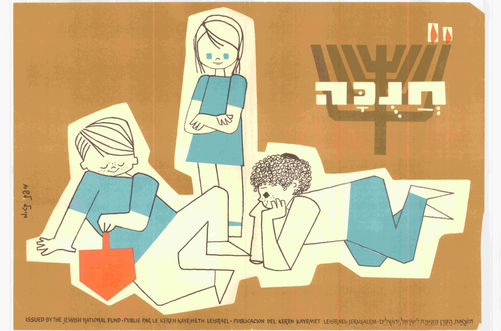
Chanukah

> Background
Chanukah is the only festival amongst the traditional festivals that does not appear in
the bible and its roots can be found in cultures that preceded the Hebrew culture. At this
time of the year the shortest day of the year takes place (December 21 in the Gregorian
calendar) after which the light increases. Cultural researchers point to the rituals of fire
that were customary in the ancient East with the objective of ensuring the renewal of
the light by the sun god. Evidence of this ancient symbol survived in the words of
Yehezkel the Profit who describe customs of the sun ritual in the Temple of G-d. The
ancient influences are still significant at present in the form of festivals of lights
celebrated worldwide, such as the Christian Christmas.
The days of the festival fall at the end of the month of Kislev, which is the peak of the
olive harvest. Ancient evidence of the agricultural foundation of Chanukah states that:
“On the twenty second (of the ninth month – Kislev) the time of the oil “......in the
Qumran scrolls (according to The Book of the Maccabbees B, “at the end of the
Maccabbees’ uprising (163 BCE), on the freeing of Jerusalem, Yehuda the Maccabee
ordered to mark the festival of Tabernacles (Succot) (although two months had passed
since the time of the festival) when the residents of Jerusalem were prohibited from
celebrating it due to the war with the Greeks. One can see in Chanukah a kind of “second
Succot and understand why we celebrate it for eight days.
As to the establishment of the new festival on this date, the twenty fifth of Kislev, we
can find in the Book of Maccabees I “in which we are told that the purification of the
temple by Yehuda the Maccabee was carried out precisely on the same day on which the
Greeks defiled it: “And it shall take place that on the twenty fifth day of the ninth
month Kislev [..] they shall rise early in the morning and ascend the new altar. And they
shall inaugurate the alter on the same day as the gentiles defiled it” (Book of
Maccabbees I, 51-52).
> The Story
Chanukah, which started with military, political and religious events, became, during the
era of the Sages, a festival the principal of which is the purification of the temple and
renewal of the ritual, due to the divine miracle. This memory is presented via the story
of the miracle of the jar of oil which appears in the Talmud Bavli in the Shabbat Tractate.
Since the time of the enlightenment and in particular the era of Zionism, the story of
human heroism again represents the festival of a nation fighting for its sovereignty and
religious freedom. This memory is presented by means of lighting torches and the figure
of Yehuda the Maccabee.
> In Zionism
The characters of the Maccabees as courageous Jews, who determined by their acts the
fate of the people and form the reality of its existence, served Zionism in its quest to
educate the people about different values than those that they were educated upon in
the Jewish tradition in exile: Yehuda was active, a fighter, renewed its sovereignty and
rebelled against the foreign regime. Expressions for such can be found since the outset
of Zionism in the form of the foundation of the “Maccabee” and the “Koach” sports
associations or by the famous expression by Herzl in his book the “The State of the
Jews”: “ Therefore I believe that this wonderful generation of Jews shall grow from the
land, The Maccabees shall rise again“. These perceptions were expressed in the working
settlement and the youth movements which customarily light inscriptions of fire to
commemorate the heroism of the Maccabees. In the IDF and in many towns there is a
tradition of “a torch relay race”. Many Chanukah songs deal with the symbolism of the
oil, fire and heroism and through them we can also understand the renewal of the values
of the festival in the Zionist era such as the song “We carry torches”.. Religious Zionism
connected between the story of the miracle and the story of the uprising in
interpretation according to which G-d succeeded by means of the Hasmonean family and
make a miracle for them which brought about victory in the battles.
> And Today
Today, after the awakening of the hegemony of the joint national ethos, it seems that
Israeli society has no clear message which represents Chanukah. There are two different
perceptions of the festival, one that emphasizes the human struggle for sovereignty and
the heroism of man and the one that emphasizes the miracle; both compete with each
other and get mixed up together in the various festival songs and its messages. Sharing
of this ethical struggle can be seen at present in the IDF (which is the symbol of heroism
in current Israeli culture), whereby various entities emphasize different values: the
battle heritage and values of heroism on the one part and the reliance on G-d and the
miracle on the other. In the important national moment of the ceremony of
Independence Day on Mount Herzl, at the peak of the ceremony, the lighting of the
beacons – in the background we can hear the song by Aaron Zeev “We bear torches” at
the centre of which is the sentence “no miracle occurred for us, we did not find a jar of
oil, we quarried the rock until we bled”. In the official ideology of the State of Israel and
Zionism the State and society are still founded on belief in the act of man.
















